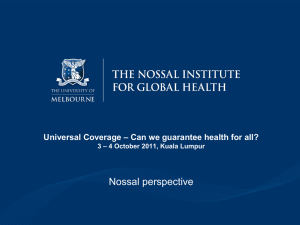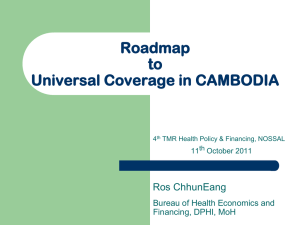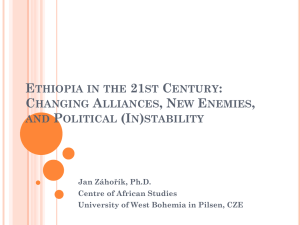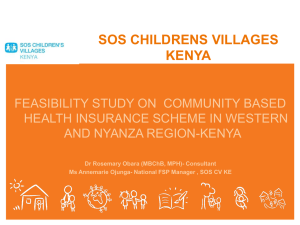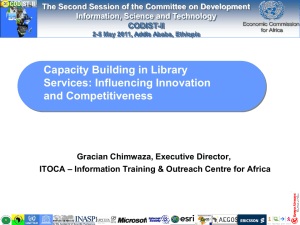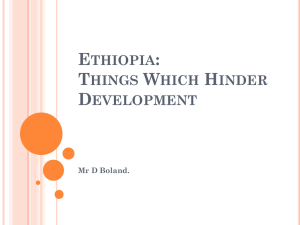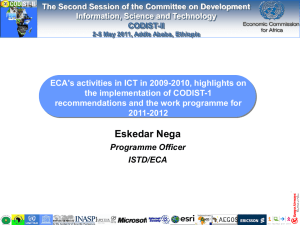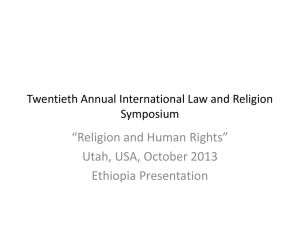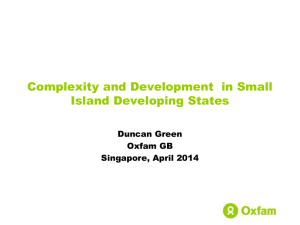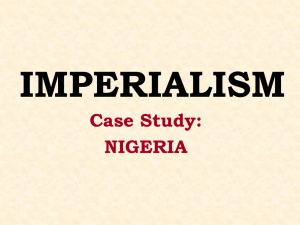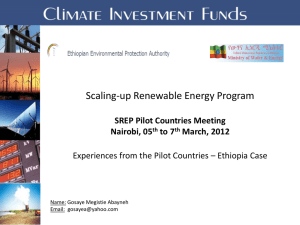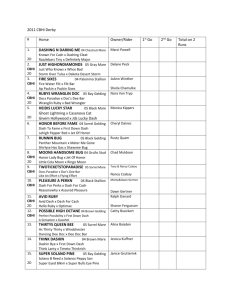CBHI-Ethiopia coalition progress presentation
advertisement
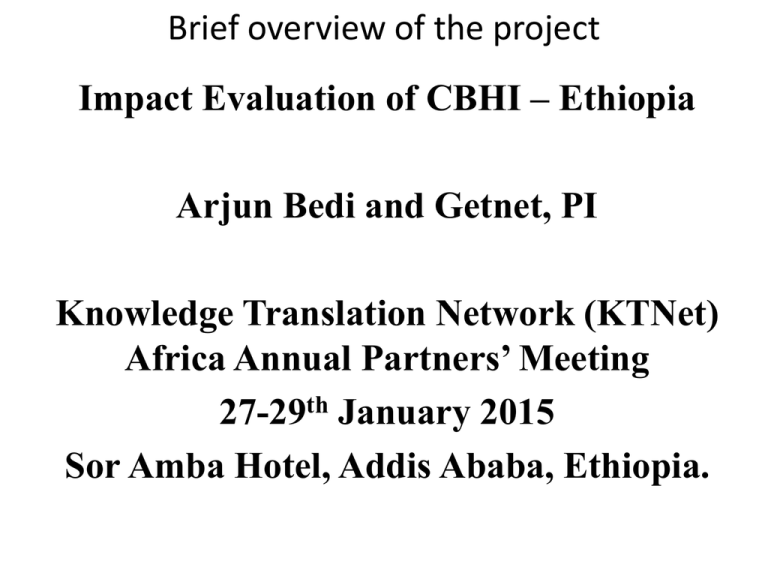
Brief overview of the project Impact Evaluation of CBHI – Ethiopia Arjun Bedi and Getnet, PI Knowledge Translation Network (KTNet) Africa Annual Partners’ Meeting 27-29th January 2015 Sor Amba Hotel, Addis Ababa, Ethiopia. Brief overview of the project • Title of the project: Impact Evaluation Community Based Health Insurance Scheme in Ethiopia • The project has three sub projects: • Project 1: Health shocks and household welfare – need for insurance – with the aim of: • Identify the conduits through which health shocks affect household welfare • Role of health shocks in perpetuating poverty • Project 2: Community based health insurance – enrolment and impact – With the aim of: • Examine how health care utilization, out-of-pocket health spending, and household responses to health shocks are affected by CBHI • Project 3: Delivering a course on evaluation of health policies: providing training on health policy and program evaluation for major stakeholders • Start and ending date: 2011- August 2015 Policy Relevant Questions • Policy relevant questions that the project seeking to answer: – How do health shocks lead to poverty? What are the pathways – the relative importance of income or health expenditure effects? – What is the scope for public intervention to prevent impoverishment due to health shocks? – Are CBHI premiums affordable? Are fee waivers targeted effectively? – Impact of CBHI on utilisation of formal health care; on, on quantity and quality of health service provision – What is the cost-recovery ratio of the health care providers in the CBHI catchment areas? – What is the scope of the CBHI to serve as a basis for a nationwide insurance system? Progress (1 slide) • At what stage is the research process? Data collection –Household surveys (each surveys covers about 1632 households/9,455 individuals) • Baseline – March/May 2011 • First follow up March/May 2012 • Second follow up- March/May 2013 –Facility survey • First round October 2012 • Second round October 2014 –Event history analysis – January 2013 –Key informant interviews and FGD - March 2013 Progress (1 slide) • Analysis – Several papers published: 1. Systematic Review of the CBHI literature (ISS WP series 568, 2013 also published in Proceedings of the Fourth Amhara regional State Economic Development Conference Organised by EEA-2013) 2. Self-reported health care seeking behavior in rural Ethiopia: Evidence from clinical vignettes (British Medical Journal Open, DOI:10.1136, 2014) 3. Coping with Shocks in Rural Ethiopia (Journal of Development Studies, Vol. 50, Issue 7, Page:1009-24, 2014) Progress (1 slide) 4. Impact of Ethiopia’s pilot CBHI scheme on household economic welfare (World Bank Economic Review in press) 5. Enrolment in Ethiopia’s Community Based Health Insurance Scheme (ISS WP series No. 578, 2013). 6. The impact of Ethiopia’s pilot community based health insurance scheme on healthcare utilization and cost of care 7. Channels of impoverishment due to ill-health in rural Ethiopia 8. Dropping out of Ethiopia’s Community Based Health Insurance scheme (forthcoming in Health Policy and Planning). Progress (1 slide) • Dissemination: – Presented findings in different forums: – International workshop (Australia, USA and Europe) – Interim workshop (1st February 2014, Harmony Hotel, Addis Ababa) – 2014 Africa Regional Forum on Universal Health Coverage 1 December 2014- Radisson Blue Hotel, Addis Ababa – Regional workshop (Amhara region) – Community dissemination workshop ( 31 Oct. 2014, Woreta) in collaboration with KTNet Africa – Organising capacity building training in collaboration with KTNet Africa (29-30 Oct. 2014- Ras Amba hotel, Addis Ababa) – Web site hosted by OSSREA since March 2014 – Email all publications to major stakeholders regularly Stakeholders Engagement (1-2 slides) • Main stakeholders are: – Ministry of Health – Ethiopian Health Insurance Agency – Abt Associate – Ethiopian Economics Association – IFPRI – USAID – Netherlands Embassy • Who are the main stakeholders for the research questions/study processes/findings/ recommended actions? • All stakeholders were involved during proposal development (Methodology workshop) Stakeholder engagement strategies • What strategies has your project used to engage your key stakeholders? – Workshops, policy briefs, sharing all our publications and discussions – Provide training for the staff of EHIA Key messages • What research findings/implications is your team advancing for stakeholder actions? – Social networks cannot protect the households against health shocks – CBHI reduces the probability of borrowing to cope up with health shocks – CBHI increases utilization of outpatient healthcare services – CBHI does not affect OOP health expenditure – CBHI reduces cost of care – Recognition of health problems and perception for modern care are not obstacles for utilization of modern health care services Key research findings • What key research findings support these messages? – Informal safety nets and reliance on friends and family for support, at least in the form of gifts is virtually non-existent. – Benefit of the CBHI is its effect on reducing the need to borrow and rely on savings. – Compared to the situation at baseline, CBHI scheme leads to a 30 to 41 percent increase in utilization of outpatient care at public facilities, a 45 to 64 percent increase in the frequency of outpatient visits to public facilities, and a 56 to 87 percent decline in the cost per outpatient visit to public facilities. – Low utilization rate in Ethiopia is not driven by the inability to recognize health problems or due to a low perceived need for modern care but are more likely to be related to other factor such as the quality and cost of available care. Challenges and opportunities (1-2 slides) • What KT related challenges has your project encountered? – Priority? – Lack of interest in negative results – Government’s desire to push ahead and scale up • How has your project over come these challenges? • What opportunities does your project envisage to overcome these challenges? KT Products (1-2 slides) • What KT products/activities has your project generated or accomplished so far? – Presenting findings in different forums: – International workshop (Australia, USA and Europe) – Interim workshop (1st February 2014, Harmony Hotel, Addis Ababa) – 2014 Africa Regional Forum on Universal Health Coverage 1 December 2014- Radisson Blue Hotel, Addis Ababa – Regional workshop (Amhara region) – Community dissemination workshop ( 31 Oct. 2014, Woreta) in collaboration with KTNet Africa – Organising capacity building training in collaboration with KTNet Africa (29-30 Oct. 2014- Ras Amba hotel, Addis Support (1-2 slides) • What support will your project require to produce and execute the planned KT products and activities? – Financial support
